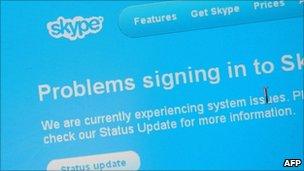Skype recovers from global blackout
- Published

Skype has been offline for almost two days for some people.
Free internet phone service Skype says it has 'stabilised' its service following a two day outage.
In a blog post put up late on 23 December, it said it was handling 90% of its typical call volume.
Audio, video and instant messaging systems that run over the Skype network were now running normally, it said.
Skype said the fault had been caused by a "software issue" on critical parts of its network.
"We take outages like this really seriously and apologise for the inconvenience," Skype chief Tony Bates told BBC News.
In a blog post, external, the company said that it would offer compensation in the form of call credit vouchers to its paying customers.
The only services left to fix were offline instant messaging and group video calls. It said the problems that took the service offline were not caused by a malicious attack. It hoped to publish a more in-depth explanation in the near future.
Business failure
In an earlier post, external, the firm said that the problem had been caused by a series of "supernode" failures. These "act a bit like phone directories", the firm said, routing traffic between users.
"If you want to talk to someone, and your Skype app can't find them immediately (for example, because they're connecting from a different location or from a different device) your computer or phone will first try to find a supernode to figure out how to reach them," it read.
"Under normal circumstances, there are a large number of supernodes available. Unfortunately, today, many of them were taken offline by a problem affecting some versions of Skype."
The firm said its engineers had tried to create "mega-supernodes" to get around the problem.
BBC reader Igor Hnatko, who runs an outsourcing company in Kuala Lumpar, Malaysia, said his firm had been "severely affected" by the outage.
"It had made me realise to what extent my business is dependent on VOIP technology and Skype as a solution to keeping in touch with clients, and employees," he said.
"Usually, Skype service is of a very high standard, but today, it has been non-existent."
He said his employees had been "unable to log into Skype at all".
"We do accounting and tax for Australian accounting firms here in Kuala Lumpur and during this crucial period in the run-up to the holidays, when our capacity is 100% taken up, we have experienced Skype collapse, which is disappointing to say the least.
"We have started looking at some alternatives, but Skype product has been a part of our business for the last five years, and having to switch to an alternative provider would be hard, but we will have to have that as a back-up plan following this incident."
Om Malik, an industry commentator and editor of the Gigaom.com website, echoed his statements.
"Skype is one of the key applications of the modern web," he wrote, external.
"It is already a hit with consumers, and over the past few years it has become part of the economic fabric for startups and small businesses around the world. I am not sure we can comprehend the productivity cost of this outage.
"The outage comes at a time when Skype is starting to ask larger corporations for their business. If I am a big business, I would be extremely cautious about adopting Skype for business, especially in light of this current outage," added Mr Malik.
- Published23 December 2010
- Published9 August 2010
- Published14 October 2010
- Published31 August 2010